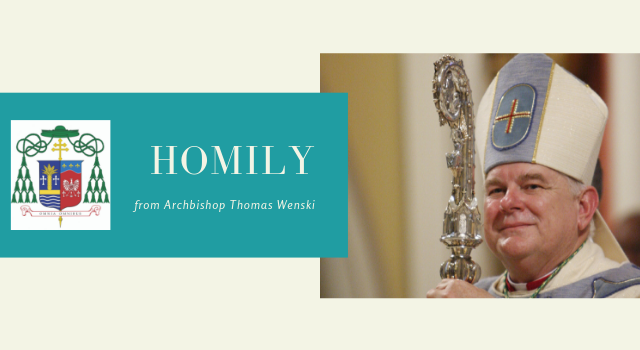By Archbishop Thomas Wenski - The Archdiocese of Miami
Archbishop Thomas Wenski preached this homily during a Mass with the Knights and Dames of the Holy Sepulcher, celebrated Oct. 25, 2020, at Little Flower Church in Coral Gables.
Today, the Knights and Dames of the Holy Sepulcher gather at this celebration of the Holy Mass on the last Sunday of October to celebrate the Order’s patroness since 1993, Our Lady of Palestine.
The feast day itself observed on this day, the 25th of October, is only just about a century old – and today about halfway between Jerusalem and Tel Aviv there is a sanctuary dedicated to Our Lady of Palestine. Of course, 100 years ago, the word “Palestine” did not describe a “political” reality – or perhaps a political dream for those who await a two-state solution to the ongoing political disputes between Palestinian Arabs and Israeli Jews. Palestine – a hundred years ago – referred not to a political entity but the geographical region that was the earthly homeland of Jesus and his mother Mary.
And so, in invoking the intercession of Our Lady of Palestine, we pray for all the peoples who today live in the Holy Land: Israelis and Palestinians, Christians, Jews, and Muslims. We pray for those who were born in there, those who have immigrated there, and those who like many of us have traveled there as pilgrims. And, our prayer is always a prayer for peace in the Holy Land.
In reflecting on today’s first reading from the 30th Sunday in Ordinary Time, we can see how important it is for people to feel that they belong. That sense of belonging – of being attached to particular people and places – gives shape to our identity and provides security in which to grow. Outside of our own small little worlds there are worlds of strangers – people we don’t know, people who are “outsiders,” different from us, not “one of us.” Too often we fear what we don’t know, or whom we don’t know; we distrust those whose background, races or belief are different than ours.
The same could be said for the ancient Israelites – yet in that first reading they were told you must not molest the stranger or oppress him. In other words, love the stranger as they loved themselves. And the reason was no further than their own experience: They only had to look to their own heart and remember when they were strangers in the land of Egypt. Loving the stranger was something that had to be done because that was what God did. In Deuteronomy we read: “It is he who sees justice done for the widow and orphan, who loves the stranger and gives him food and clothing. Love the stranger then, for you were strangers in the land of Egypt.”
In the Gospel today, Jesus speaks of the power of love, when he tells his followers: You must love your neighbor as yourself. As the Israelites were asked to love the stranger as they loved themselves, so we Christians are to love our neighbor.
The real stranger is not necessarily the person we don’t know, but the person we don’t want to know, the person we refuse to love. That person could be a neighbor or a member of our own family. We all can have strangers in our own house still waiting to be welcomed and loved. And, in the parable of the Good Samaritan, Jesus explains that the neighbor is simply the one near us who needs our help.
Of course, our fears hold us back – we often do not extend a hand because we don’t want to be taken advantage of, to be used. And of course, people can be demanding. We give an inch and they take a mile. And so, we hide behind locked doors and locked hearts.
In Palestine today history has conspired to throw together an assortment of peoples, races, religions that are still strangers to one another, divided by fear and mistrust.
For these strangers to live together as neighbors they must learn to accept one another as brothers and sisters. Of course, this is also true of the rest of the world. As Pope Benedict once famously said: globalization has made us all neighbors, but it hasn’t made us brothers. We too are divided by our own fears and distrust as the polarization of our politics shows only too clearly.
The Scriptures challenge all of us to love the stranger, to love the neighbor as we love ourselves ... to love the stranger, to love the neighbor as God also loves him.
For, in the end, we all need strangers and neighbors to test the quality of our mercy. For when we minister to the stranger, or the neighbor, we minister to Christ who will remind us at the Last Judgment: What you did for the least of my brethren you did for me.
Our Lady of Palestine pray for us.

